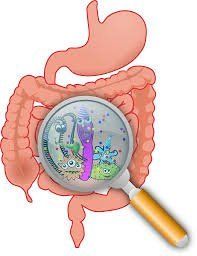
Dysbiosis
Dysbiosis is an imbalance in your gut micro-flora caused by too many bad bacteria, yeast, and sometimes parasites and not enough beneficial bacteria. In a normal healthy digestive system the gut micro-flora are in symbiosis, meaning that there are plenty of "good" or "beneficial" bacteria, along side some indifferent or benign microbes and not many "bad" or pathogenic microbes. Good bacteria are called so because they digest components of food that we cannot, e.g. fibre, and provide us with some vitamins (e.g. Vit K) and also fatty acids. The benign microbes are usually neither harmful or helpful, and obviously the pathogenic microbes can cause illness and disease.
What are the Symptoms?
Unfortunately, similar to Candida (above) the symptoms can be different in each individual, occuring in different parts of the body, and causing symptoms specific to that individual; this is why it is often misdiagnosed/undiagnosed. Signs and symptoms you may experience include:
What are the Symptoms?
Unfortunately, similar to Candida (above) the symptoms can be different in each individual, occuring in different parts of the body, and causing symptoms specific to that individual; this is why it is often misdiagnosed/undiagnosed. Signs and symptoms you may experience include:
- Frequent gas or bloating (several days per week) - particularly after carbohydrate based meals
- Carbohydrate intolerance, particularly after fiber and/or beans
- Looser stools, diarrheoa, constipation, or a
- Diagnosis of Irritable Bowel Syndrome (IBS)
- Cramping, urgency, and/or mucus in your stool
- History of “stomach bugs,” gastroenteritis, and/or food poisoning
- Brain fog, anxiety and/or depression
- Fatigue or low energy
- Food sensitivities
- Missing micronutrients
- Sinus congestion
- Chronic bad breath
- Autoimmunity, or an autoimmune condition such as Hashimoto’s thyroiditis, psoriasis, or multiple sclerosis
